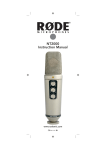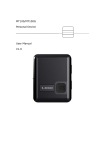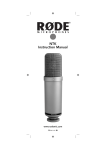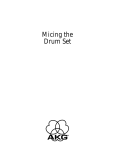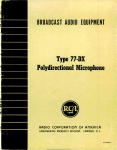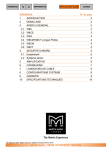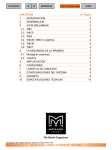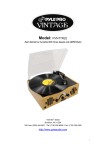Download Rode NT2-a
Transcript
NT2-A Instruction Manual www.rodemic.com 037-950-1-1_NT2-Akit_manual.indd 1 (EMC, LVD) 15/06/2010 4:33:28 PM Introduction We at the would like to thank you for investing in NT2-A Multi-Pattern Large Diaphragm Condenser Microphone. The NT2-A carries on the tradition forged by the legendary NT2. It was recognised as the World’s Best Studio Microphone by the MIPA in 2006, in addition to being awarded the Electronic Musician Editor’s Choice. The NT2-A’s ability to evoke the silky smooth character of the legendary microphones of the 50’s and 60’s combined with its flexibility and superlative audio characteristics make it one of the most versatile condenser mics available. We’ve titled this the ‘NT2-A Studio Solution’ as we’ve included everything you need to get truly professional vocal recordings - The world’s best studio microphone, a studio grade pop shield and shock mount, premium cable, dust cover and of course ’s industry leading ten year warranty. Not to mention, you also receive a free DVD exclusive to this Studio Solution package, with Grammy™ nominated producer John Merchant showing you how to get the best recordings from your NT2-A. Please take the time to visit www.rodemic.com and register your microphone for a full ten year warranty. Peter Freedman Microphones Sydney, Australia 037-950-1-1_NT2-Akit_manual.indd 2 -2- 15/06/2010 4:33:31 PM Specifications Acoustic Principle: Pressure, Pressure gradient Directional Pattern: Three position variable - Omni, Cardioid or Figure 8 (see graph) Frequency Range: 20 Hz - 20 kHz (see graph) Output Impedence: 200Ω Sensitivity: -36 dB re 1 Volt/Pascal (16 mV @ 94 dB SPL) +/- 2 dB @ 1kHz Equivalent Noise: 7dBA SPL (per IEC651) Maximum Output: +16dBu (@ 1kHz, 1% THD into 1KΩ load) Dynamic Range: 140 dB (per IEC651, IEC268-15) Maximum SPL: 147dB SPL (@ 1kHz, 1% THD into 1KΩ load) (157dB with PAD at maximum) Signal/Noise: 87 dB SPL (A - weighted per IEC651) Power Requirement: P48 (48V) phantom supply Net Weight: 860gm 037-950-1-1_NT2-Akit_manual.indd 3 -3- 15/06/2010 4:33:32 PM Specifications Frequency Response 20 dB re 1 V/Pa 10 0 -10 -20 -30 20Hz 100 1000 10 000 20 000 10 000 20 000 Cardioid 20 dB re 1 V/Pa 10 0 -10 -20 -30 20Hz 100 1000 Omni Polar Response 037-950-1-1_NT2-Akit_manual.indd 4 Cardioid Omni Figure 8 -4- 15/06/2010 4:33:32 PM Features • Large 1” gold sputtered capsule • On-body control of polar pattern, HPF and PAD • Three position variable polar pattern Omni, Cardioid or Figure 8 • Three position variable High-Pass Filter Flat, 40Hz or 80Hz • Three position PAD - 0dB, -5dB or -10dB • Ultra low noise, transformerless surface mount circuitry • Wide dynamic range • Internal capsule shock mounting • Made in Australia • Full 10 Year warranty* Accessories SM6 Shock mount (including studio grade pop shield) Microphone sleeve/ dustcover Premium XLR Cable *Online product registration required. 037-950-1-1_NT2-Akit_manual.indd 5 -5- 15/06/2010 4:33:33 PM Using the NT2-A • The NT2-A is a phantom powered microphone. To operate correctly it requires a 48V phantom supply from the mixing console or other source. • Please ensure all cable connections are secure before applying power to the microphone, and allow a few moments for the microphone to stabilise after the power is turned on. • The gold dot on the face of the NT2-A indicates the front of the microphone, and the pick-up area of the cardioid pattern. Please be sure to have the side with the dot facing the sound source you wish to record. 037-950-1-1_NT2-Akit_manual.indd 6 -6- 15/06/2010 4:33:35 PM Using the NT2-A • Microphone technique, or how to get the sound you want, requires experimentation. We suggest that you start with the channel EQ set to ‘OFF’ or ‘FLAT’ (no boost or cut). Try to get the sound you want by placing either reflective or absorbent panels at various angles adjacent to the source being recorded. • Changing the acoustic properties of the space around the microphone is our recommended initial approach for obtaining best sound quality. Remember you cannot change a room’s acoustic properties with EQ. • When the preferred sound has been achieved (as above) then EQ and effects such as reverb or indeed any signal processing can be used for enhancement, but should be used sparingly. • It is worth mentioning that sometimes ‘cutting’ a particular frequency (sound) may be preferable to ‘boosting’ another. Of course ‘boosting’ can increase noise level and so should be done minimally. • As with many other aspects of the recording process, finding the preferred ‘sound’ is a matter of experimentation. 037-950-1-1_NT2-Akit_manual.indd 7 -7- 15/06/2010 4:33:35 PM Setting the Polar Pattern The NT2-A polar pattern can be adjusted to either omni, through cardioid or figure of eight. This flexibility allows for more versatile recording of vocals, instruments and sound sources. After making a selection change, allow a few moments for the microphone to stabilise. Selector Switch • Select the polar pattern via the top selector switch on the NT2-A body. • When the cardioid position is selected (center), the microphone picks up sound from in front of the microphone, and rejects sound from the rear. 037-950-1-1_NT2-Akit_manual.indd 8 Front is picked up Rear is rejected -8- 15/06/2010 4:33:36 PM Setting the Polar Pattern • When in the omni position (lower position), the microphone picks up sound from all around the microphone and there is less proximity effect than in cardioid mode. (Proximity Effect is an increase in lower (bass) frequencies when the sound source is ‘close’ to the microphone). The omni pattern is commonly used for room (ambient) miking or to record a more natural sound when close miking instruments. Front is picked up Rear and sides are picked up • When in the figure 8 position (upper position), the microphone picks up sound from in front and behind, and rejects sound from the other two sides. This pattern is commonly used for interviews (Two people with the microphone between them) or in conjunction with a cardioid microphone to use the MS (mid-side) stereo recording technique. 037-950-1-1_NT2-Akit_manual.indd 9 Front is picked up Rear is picked up Sides are rejected -9- 15/06/2010 4:33:36 PM Setting the High-Pass Filter The High-Pass Filter setting can be used to reduce the microphone’s sensitivity to low frequency sounds, and is useful when you wish to avoid additional noise and vibration from outside traffic, air conditioning and machinery, foot tapping etc. The middle selector switch on the front of the NT2-A can be used to set the High-Pass Filter to 0Hz/Flat (center position), 40Hz (lower position) or 80Hz (upper position). Setting the PAD The PAD setting can be used to attenuate the output level of the microphone so that it does not exceed the maximum input level of your recording device. This is useful when recording high SPL sources such as guitar amplifiers or percussion. The bottom selector switch on the front of the NT2-A can be used to set the PAD at 0 (center position), -5dB (lower position) or -10dB (upper position). Storage • After use the NT2-A should be removed from its mount, wiped with a dry, soft cloth and placed in the provided microphone sleeve/dust cover. • Be sure to place the moisture-absorbent crystals (supplied) at the head of the microphone, so as to absorb any moisture present. • Eventually this pack of crystals will need to be dried. This is indicated by the crystals turning pink in colour. They can easily be re-used by placing them in an oven at 100 - 150 degrees celsius for approximately ten minutes. The crystals will operate effectively again once they have turned blue. 037-950-1-1_NT2-Akit_manual.indd 10 - 10 - 15/06/2010 4:33:36 PM Settings Reminder You may wish to keep a record of the settings you have made during a recording. Should you wish to recreate a section of a recording, or to capture the same “sound quality”, you can refer to the manual and easily retrieve the mic’s previous settings. Date: / Date: / / / Description: Description: Date: Date: / / / / Description: Description: Date: Date: / / Description: 037-950-1-1_NT2-Akit_manual.indd 11 / / Description: - 11 - 15/06/2010 4:33:36 PM Support If you experience any problem, or have questions regarding your microphone, first contact the dealer who sold it to you. We have an extensive dealer network to assist you. If you have difficulty getting the advice or assistance you require from the dealer, do not hesitate to contact us directly via the details below. International 107 Carnarvon Street Silverwater NSW 2128 Australia Ph: +61 2 9648 5855 Fax: +61 2 9648 2455 USA P.O. Box 4189 Santa Barbara, CA 93140-4189 Ph: 805 566 7777 Fax: 805 566 0071 Technical Support For information and technical support please visit www.rodemic.com/support 037-950-1-1_NT2-Akit_manual.indd 12 - 12 - 15/06/2010 4:33:36 PM












